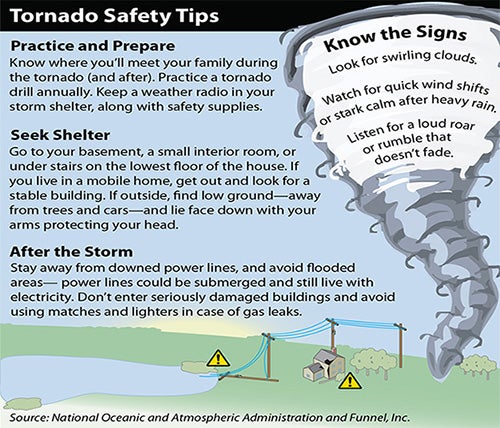Severe storms and natural disasters can cause a variety of electrical safety hazards in and around our homes. Lightning and downed power lines are just a few of the serious safety concerns associated with storms. Unfortunately, many of these electrical safety hazards remain long after the storm itself has passed.
To help protect you from storm-related electrical hazards, the Electrical Safety Foundation International (ESFI) and Maquoketa Valley Electric Cooperative are providing answers to common storm safety questions.
Lightning
What should I do if I am caught outside during a lightning storm? Move to a low point. Lightning hits the tallest available object, so get down low in a crouched position if you are in an exposed area. Stay away from trees. Avoid metal. Don’t hold onto metal items like bats, golf clubs, fishing rods, tennis rackets, or tools. Stay away from metal sheds, clotheslines, poles, and fences. Stay away from water, including pools, lakes, puddles, and anything damp—like grass.
Don’t stand close to other people. Spread out.
Is there any sort of warning before lightning strikes? Not necessarily, but sometimes. If you feel a tingling sensation or your hair stands on end, lightning may be about to strike. Do not lie down. Instead, crouch down, tuck your head, and cover your ears.
What should I do if I encounter a lightning storm while driving in my car? Slow down and use extra caution. If possible, pull off the road into a safe area.
Am I safer in or out of my car? Do not leave your vehicle during a thunderstorm. A vehicle is considered safe during a thunderstorm if it is fully enclosed with a metal top such as a hard-topped car, minivan, bus, truck, etc. While inside a safe vehicle do not use electronic devices, such as radio communications.
The storm is still raging outside. Are we safe from lightning if we stay inside the house?
Follow these indoor lightning safety tips to help keep your family safe inside while it’s storming outside:
• To avoid lightning strikes, stay away from windows and doors.
• If possible, unplug electronic equipment before the storm arrives. Avoid contact with electrical equipment and cords during storms.
• Avoid contact with water and plumbing, including sinks, baths and faucets.
Can I talk on the telephone during an electrical storm? Use corded telephones only for emergencies. You can use cordless or cellular phones.
I have an outside dog. Is it okay to leave him out there during a lightning storm? Doghouses are not lightning-safe, and chained animals can easily become victims of lightning strikes. You should bring your pets inside to protect them.
Power Lines
What should I do if I encounter a downed power line? If you see a downed power line, move at least 10 feet away from the line and anything touching it. The human body is a ready conductor of electricity. The proper way to move away from the line is to shuffle away with small steps, keeping your feet together and on the ground at all times. This will minimize the potential for a strong electric shock. Electricity wants to move from a high voltage zone to a low voltage zone—and it could do that through your body.
What can I do to help someone who has come in contact with a downed power line? If you see someone who is in direct or indirect contact with the downed line, do not touch the person. You could become the next victim. Call 911 instead.
Can I use something that is not metal to try to move a downed power line myself? Do not attempt to move a downed power line or anything in contact with the line by using another object such as a broom or stick. Even non-conductive materials like wood or cloth, if slightly wet, can conduct electricity and then electrocute you.
What should I do if I see a downed power line in the street while I am driving my car? Do not drive over downed power lines.
What if a power line comes down onto my car or I didn’t see it until I’ve driven into it? If you are in your car and it is in contact with the downed line, stay in your car. Tell others to stay away from your vehicle. If you must leave your car because it’s on fire, jump out of the vehicle with both feet together and avoid contact with the live car and the ground at the same time. This way you avoid being the path of electricity from the car to the earth. Shuffle away from the car.
Is a downed power line still dangerous if it has come down in water, like a pool or pond?
Water is a good conductor of electricity. Any amount of water—even a puddle—could become energized. Be careful not to touch water—or anything in contact with the water—near where there is a downed power line.
Post-Evacuation
The storm is finally over. Can I go home now? First and foremost, do NOT return home until instructed by the appropriate local authorities. Once they give the go-ahead, return home during daylight hours, especially if power has not been restored. If you smell gas, leave the premises and notify emergency authorities immediately. Do not turn on lights, light matches, or engage in any activity that could create a spark.
I’ve been told by my local authorities that I can return home now, but could there still be electrical dangers in and around my home? Yes. Even if you have been authorized to return home, you should still take precautions to protect yourself from electrical hazards posed by downed power lines, flooded areas, and water-damaged appliances and electrical equipment.


